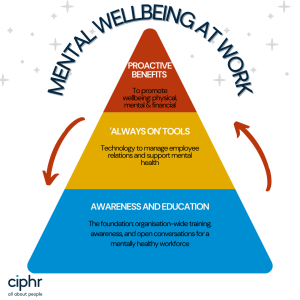Mental health and wellbeing are the foundation of a positive employee experience, but have you considered how a mentally healthy workforce can also benefit your organisation?
In this survey by Mind, nearly two-thirds (56%) of respondents said they would ‘be more productive’ if their employers took action to support the mental wellbeing of all staff.; a further half (50%) said they would ‘be less likely to take time off’. Surprisingly, a fifth (21%) would ‘accept a pay freeze or smaller pay rise’ if they were offered wellbeing initiatives.
Not only does mental wellbeing and support improve the way employees perceive, experience and engage with your organisation, but robust initiatives can have a meaningful impact on your bottom line.
The mental health challenges facing UK employers and employees
According to the Mental Health Foundation, one in six UK adults has a common mental disorder. Mixed anxiety and depression are Britain’s most common mental health disorders, with 7.8% of people meeting the criteria for diagnosis.
Furthermore, nearly one in seven people experience mental health problems in the workplace, and women in full-time employment are nearly twice as likely to have a common mental health problem as full-time employed men (19.8% vs 10.9%).
But what about the less-obvious influences on mental health and neurodiversity at work? As more organisations prioritise creating a great employee experience, the understanding that it’s impossible to entirely separate home and work has grown, too. Forward-thinking organisations appreciate that a healthy work-life balance ebbs and flows, and that ‘outside of work’ stressors can have significant effects on an employee’s performance at work. Although employers’ duty of care extends only to a certain point, those who really understand the breadth and depth of mental health challenges are continually in search of meaningful ways to support their people.
The impact of mental health problems on both individuals and organisations is significant. Some of the biggest obstacles mental health-related issues can cause for employers include:
- High absenteeism, which hampers productivity, impacts morale, and increases costs
- ‘Presenteeism’, when employees are not fulfilling their roles due to ill-health
- Decreased quality of work, which can impact customer satisfaction
- Comorbidities related to compromised mental health, including physical illnesses
- Potentially high attrition rates, as well as the cost of hiring and training replacements
The real cost of work-related ill health
Stress, depression or anxiety accounted for 17 million working days lost in 2021/22. People suffering from these three illnesses took an average of 18.6 days off work in the same period. It therefore makes sense to offer a proactive support system to affected employees. Robust support, initiatives, and programmes not only help to reduce the cost and frequency of absenteeism, but also enables employees to continue earning their full wage while dealing with mental health concerns – many of which are exacerbated by financial difficulty. In fact, most (64%) of people with in-person roles say they can’t afford to take time off work when they’re sick according to a 2023 Ciphr study.
Many UK organisations have introduced employee assistance programmes (EAPs) to support individuals facing challenges ranging from anxiety and depression to financial worries and physical health concerns. But EAPs often have a fair use policy, leaving vulnerable and affected employees who need ongoing, long-term support, struggling. Better mental health support in the workplace can save UK businesses up to £8 billion annually, but what does ‘better’ look like?
Mental health awareness, training, and support for psychological safety
Psychological safety refers to employees feeling secure enough to bring their full selves to work. This includes feeling safe taking risks, expressing ideas, asking questions, raising concerns, and admitting to mistakes without the fear of reprisal. It also includes feeling safe in talking about their mental wellbeing, regardless of whether they’re struggling. For a workplace to be psychologically safe, every employee must understand their role in creating an inclusive, diverse and equitable culture. Inclusivity is the foundation of an environment that upholds mental wellbeing, too.
It’s important to remember that employees will be facing different challenges that contribute to their mental wellbeing, and a ‘one-size-fits-all’ approach rarely offers the right level of support. Below, we’ll explore the three most adaptable approaches to supporting every employee’s mental wellbeing.
Three ways employers can champion mental wellbeing in the workplace

1. Foundation phase: mental health awareness e learning
Learning about mental health should be an organisational objective, and is the first step to creating a mentally healthy workforce. From apprentices to employees, their managers and the C-suite, mental health can affect anyone — directly and indirectly. Offering your people mental health awareness e learning is a great way to provide the material and knowledge needed to help them identify and seek support for mental health challenges.
Marshall E-Learning consultancy, part of the Ciphr Group, has over 20 years of experience in digital learning. Given that line managers are often the first port of call for employees who are struggling with mental health, it makes sense to offer this cohort tailored training to ensure they’re equipped to handle these, often tricky, situations. Management training micro learning courses are a great way to teach new (and seasoned) managers the essential learning points they need, and how to apply them when they need it. Popular topics include:
- Communication
- Defining management
- Equality and diversity
- Recruitment and selection
- Time management
- Discipline and grievance
- Managing absence
- Managing budgets
- Managing teams
- Staff induction
- Performance review
These modules are available as individual courses, meaning any employee who is interested in learning about mental health in the workplace can easily access the training. What’s more, these modules are, on average, only 10 minutes each.
Our mental health and wellbeing eLearning pack is a comprehensive suite of content that’s suitable for any and all employees, regardless of their role or seniority. Using easy-to-consume videos and interactive assessments, this course is brimming with practical advice delivered by industry experts and can benefit individuals, managers, and senior leaders alike.
Offering voluntary e learning is an effective way to build a repository of mental health first aiders (MHFA). It allows you to cultivate interest in the topic and gauge which employees might be eager to become designated mental health first aiders through further structured training. Having multiple MHFAs ensures consistency, and provides a crucial first point of contact for employees experiencing a crisis, whom they can easily reach by clicking through their HR software dashboard.
Request a free consultation to discover how Ciphr’s eLearning content and software can help you deliver high-quality mental wellbeing training across your organisation.
2. ‘Always on’ technology: employee relations tools to manage mental wellbeing
To facilitate and deliver your mental health e learning, you’ll need a learning management system (LMS). These e learning platforms should be easily accessible for employees, while safeguarding data and sensitive information.
Integrating your HR and LMS software adds further value through its ability to effortlessly store employee data, assign appropriate workplace learning, and monitor engagement and completion rates. An integrated HR and payroll solution can assist in the event of employees needing to take time off due to mental ill-health, whether through paid sick leave or statutory sick pay.
Employee relations and HR case management software helps managers keep track of their direct reports’ mental health and wellbeing. Line managers can store correspondence records and supporting documents against individual cases in a GDPR compliant way, ensuring trust and transparency – both of which are critical when handling sensitive information. This can effortlessly be shared with HR teams as needed to ensure duty of care is upheld and employee safety protocols are followed.
Ciphr HR is the ‘always on’ tool that allows HR teams, managers and employees to navigate workplace wellbeing without being inundated with time-consuming tasks, admin, or processes. It allows you to focus on the human element, while it takes care of tracking and monitoring.
There is a plethora of tools, systems and software available to help organisations of all sizes to offer robust, meaningful mental health and wellbeing support to their people. But how can employers take that to the next level, and promote wellbeing among their workforce?
3. A holistic solution for mental health support: benefits that promote mental wellbeing
Extending past the ‘day-to-day’ support, your organisation might consider offering supplementary benefits that actively promote all aspects of wellbeing – physical, mental, and financial. Ciphr itself offers its employees a host of practical benefits, designed to offer flexible support at every stage of their life (and career). These include:
- Private medical and dental cover for employees, their children, and spouses
- Income protection insurance and Life Assurance
- Enhanced paid parental leave, including ‘family forming’, helping to reduce stress at a crucial transition point
- Health cash plan, to encourage proactive health care including health screenings and alternative therapies
- Help@Hand, a wellbeing support portal with fast, direct access to health and wellbeing support services including remote GP, mental health support, and medical second opinions
- Volunteer days, for employees to give back without compromising their income
- Family annual National Trust membership which allows employees to explore the outdoors with their loved ones
- Additional holiday entitlement to encourage sufficient periods of rest and time away from work
- Gym loans, Cycle to Work scheme, and Technology Loan benefits to support financial wellbeing
Speaking on these benefits, Claire Williams – Chief People Officer at Ciphr – says:
“We have worked hard to constantly build and evolve our benefits offering to foster a workplace culture that truly prioritises the mental health and overall wellness of our employees. These benefits go beyond traditional healthcare and reward packages, offering resources to support mental health, physical wellbeing, financial health, and to help manage stress in the workplace.
“By addressing all facets of wellbeing, employers not only help their employees stay physically fit and financially secure but also create an environment where mental wellbeing is actively supported. This holistic approach is designed to not only boost employee morale and engagement, but also to reduce stress and anxiety, ultimately leading to a more productive and resilient workforce.
“We hope that these benefits demonstrate our commitment to the overall welfare of our employees and can contribute to a more satisfied, motivated, and mentally healthy workforce.”
You can also encourage better work-life balance in more subtle ways:
- Gently reminding employees to take regular breaks (including paid holidays)
- Encouraging staff to explore nature and get their steps in, even on a lunch break
- Offering slightly more flexible working patterns to alleviate some stress from their day-to-day lives
- Internal communications reminding employees of the benefits and resources available to them
- Awareness weeks encouraging communication and offering representation
- Offering healthy challenges to promote positive lifestyle changes
- Providing healthy snacks for office-based workers to enjoy
Whether you’re looking for mental health and wellbeing initiatives at scale, or newly exploring the options — Ciphr’s learning experts are available to support you through the process.
Explore the benefits of workplace wellbeing
Promoting and supporting workplace wellbeing has never been more important, or more achievable. Raising awareness, developing understanding, and offering the right type of support can make a world of difference to your people, and ultimately, your brand.
Request a demo today or download our brochure to learn how Ciphr can help you achieve this.
Explore the topic of workplace wellbeing, eLearning, and the employee experience in greater detail, here:
